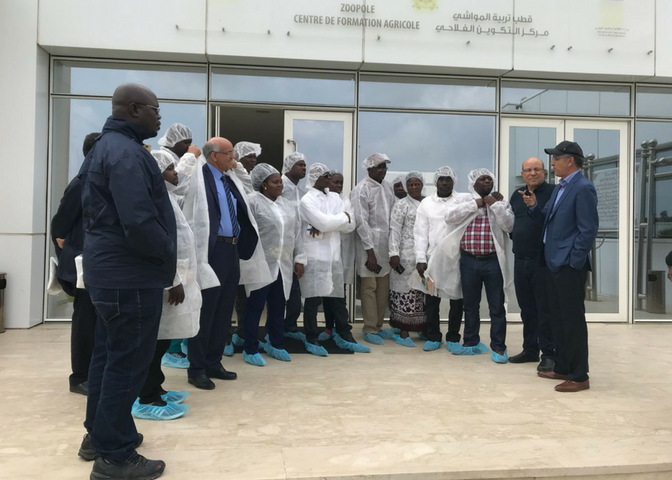Building export markets in West Africa is, quite literally, a chicken-and-egg issue. To capture the long-term feed demand from the region’s expanding poultry industry, the U.S. Grains Council (USGC) is helping regional producers learn how to improve their businesses, which could include imports of feed grains and co-products from sources like the United States.
In May 2018, the Council and the Moroccan Federation of Poultry Associations (FISA) sponsored the first of three training programs scheduled this year for West African poultry producers, held in Casablanca, Morocco.
This training program brought together 13 poultry producers from Benin and Togo for a comprehensive training in broiler management and layer production techniques, coupled with practical hands-on training at FISA’s poultry training center. Trainees also participated in on-site visits to commercial broiler farmers, feed mills and slaughterhouse facilities.
“Driven by changing demographics, urbanization and changing consumption behaviors, a more modern and professional poultry industry is forming in Africa,” said Katy Wyatt, USGC manager of global strategies, who attended the program. “These trainings provide West African poultry producers with a vision for future development around which the industry can rally.”
More than half of global population growth by 2050 is expected to occur in Africa, with West Africa alone expected to account for 15 percent of this growth. Poultry remains the leading source of meat protein there, meaning modernizing and industrializing poultry farms in West Africa is an important component of food security.
The 2018 training series follows a successful USGC-led effort last year to engage the West African poultry industry, with the help of a grant from the North Dakota Corn Utilization Council. More than 35 poultry producers from Guinea, Senegal and C’ote D’Ivoire attended training in Morocco in 2017. Word of the program’s value spread, leading five of the recent training participants to pay their own way, further demonstrating the increasing local industry buy-in for the program.
Designed as a train-the-trainer program, these activities promote the advancement of the West African poultry industry by providing technical training as well as the skills and vision for longer-term development of local poultry industries. The week-long trainings are customized to the requirements of the individual countries, including pullet management, egg layer production and technical and economic management of broiler production.
The Council, in partnership with FISA, will organize two more training programs in 2018 to continue this effort, with the next program scheduled for July 2018 for 12 poultry producers and technicians from Burkina Faso and Mali.
The strategic goal of these training programs is to build broader capacity on the continent, supporting local producers as part of a long-term market development effort for U.S. grain exports into West Africa. Sales have already started to Senegal and Nigeria, which imported 245,000 metric tons (9.6 million bushels) of U.S. corn in the 2016/2017 marketing year.
“These trainings provide producers with the opportunity to learn from leading poultry experts in Morocco,” Wyatt said. “Expanded engagement in 2018 will provide West African poultry producers the technical skills necessary to improve their poultry operations, becoming examples of modern production practices and improved farm management practices in the region. Our involvement in this effort is a critical part of carrying out our mission to develop markets and enable trade while improving lives.”
About The U.S. Grains Council
The U.S. Grains Council develops export markets for U.S. barley, corn, sorghum and related products including distiller’s dried grains with solubles (DDGS) and ethanol. With full-time presence in 28 locations, the Council operates programs in more than 50 countries and the European Union. The Council believes exports are vital to global economic development and to U.S. agriculture’s profitability. Detailed information about the Council and its programs is online at www.grains.org.


